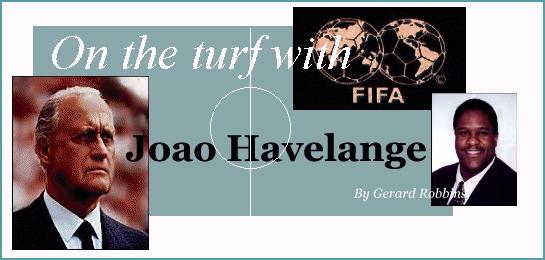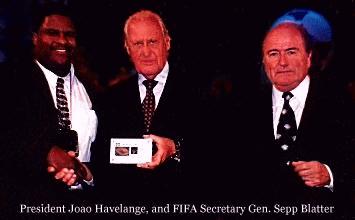

No doubt still the most powerful man in the world of soccer today is Joao Havelange, President of FIFA the Federation Internationale de Football Association. He has held a firm grip on the world organizing body of soccer (FIFA) for more than 24 years. In his youth an accomplished athlete; swimming for Brasil's Olympic team in the 36 Olympics in Berlin, again on Brasil's Olympics Water Polo team at Helsinki in 1952. He then served as head of the Brazilian delegation at the Olympic Games in Melbourne in 1956.
Joao Havelange is no stranger to international sports competition. Still in excellent health, he participates in the Gusti Cup, a friendly match amongst celebrities held annually in memory of former UEFA President, Gustav Wiederkebr.

La Cancha had the pleasure of personally meeting President Havelange recently
in Paris. It was there where we presented him with a award for his lifelong
contribution to the world's greatest sport, an acrylic block containing
blades of preserved grass from the surface of America's first World Cup.
In a rare interview below , President Havelange tells us who he thinks is
the best player of all time and who he expects to win the World Cup in France.
We also asked President Havelange who he thinks should be his successor
upon his retirement. As our magazine primarily focuses on the grass
surfaces of the world's most popular sport (soccer) we have have included
his responses regarding the playing surfaces of World Cup.
Q: Who do you support for the position of the next
president of FIFA?
A: I don't have a preference. There are
two candidates, Mr. Lennart Johannson and Mr.Joseph Blatter. FIFA has
two hundred affiliated countries and in the congressional meeting of June
8th they will make the decision.
Q: What is your opinion of Ronaldo and the selection
in general.
A: Well, I think we have an excellent
selection however all of the teams are in good condition.
I think you will see the world applaud whoever wins this World Cup because
of the level of play which will come from all of the participants
Q: Who do you think will win the World Cup this
year.?
A: I can't say. It's like the national
lottery, anyone can win, but at the same time know one can say really knows
who will be the champion.
Q: Who would you prefer to win? Would you like to see
Brasil win for the fifth time?
A: For me I am happy to see any country
win the World Cup.
Q: Why has Brasil been consistently the best team in
the world?
A: It is because of the quality of the
players, their discipline as well as the experience of the coaches.
Q: In your opinion, who is the best futebol player
of all time?
A: Indisputably Pele.
Q: As the term "La Cancha" refers to the
playing field, and the field being the focus of our magazine, I'd like to
ask you a few question in that regard.. There has been much discussion
about players and coaches, however little has been written or said about
the surfaces upon which World Cup games have been played. With regard
to the past. have all World Cup games been played on natural
grass?.
A: All matches in the World Cup finals have
been played on natural grass. Although the laws of the game (which
apply to all football activity) do not stipulate that the playing surface
must be of grass, this has historically been the normal playing surface
and all major events have always been contested on grass. The World
Cup regulations now state that the games must be played on grass.
Q: How much has the design
of the playing surface contributed to the level of play over the
years?
A: By "design" of playing surface we understand
you mean the quality of the surface; if so, there is no doubt that football
benefits from a first-class playing surface, as the ball runs and bounces
more truly, the players have a better grip, and above all, they have more
confidence in their play, being no longer hesitant in their actions because
they know the ball will behave as it should. FIFA encourages improvements
in field quality; but this is relevant not only at the top end of the performance
scale but more importantly at the lower end.
Q: Dr. Havelange, as you may be aware, in America,
the ACT Team (ARCHITECTURE - CONSTRUCTION &
TURF) was responsible for ensuring uniformity in all of the playing
fields of Americas first World Cup. However, there were two special
projects, one at Giants Stadium in New Jersey headed by Dr. James Watson,
and the other, the Pontiac Silverdome in Michigan head by Dr. John N. Rogers
III. Both sites had temporary turfgrass installed in order to comply
with FIFA regulation. Although all of the playing surfaces were uniform.
most of the press as well as the players indicated that these two fields
were the best they had ever played on. Did you visit those two venues, and
if do how did you rate America's temporary grass
surfaces?
A: FIFA greatly appreciated the work done at
the 1994 world Cup by the ACT Team, a highly professional organization which
produced excellent results. The work done at the GIants Stadium and,
especially in the Silverdome also earned FIFA's recognition because of the
pioneering world and technical problems involved. Of course I
visited all venues during the World Cup, as well as beforehand, and took
careful note of the comments of all experts involved; the most important
of these are of course the players themselves. Their enthusiastic attitude
towards these playing surfaces vindicated FIFA's decision to use these two
stadia despite the mentioned technical difficulty.
Q: Do you foresee the possibility of temporary turfgrass
being used in future World Cup Games?
A: Temporary turf is unlikely to be used in
the next two World Cups, and certainly not in France 1998, where all matches
will be played in established football stadia. The 1998 stadia are
Paris/St Denis (Grande Stade), Paris (Parc des Princes), Lens (Felix Hollaert),
Lyon (Gerland),
St. Etienne (Geoffrey Guichard), Marseille (Velodrome), Montpellier (Mosson).
Toulouse (Le Stadium), Bordeaux (Lescure) and Nantes (Beaujoire). All
the French stadia have natural grass. Should any of these stadia need to
replace the existing surfaces, this is the responsibility of the World Cup
Organising Committee.
TABLE OF CONTENTS \ Your comments & suggestions are welcome:gerardr@lacancha.com